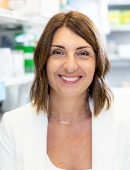Biography
Eirini Papapetrou studies blood disorders, particularly myeloid malignancies, with human pluripotent stem cells. Her lab developed the first iPSC models of Myelodysplastic Syndromes and Acute Myeloid Leukemia. The Papapetrou lab combines expertise in induced pluripotent stem (iPS) cell generation, genome editing (CRISPR) and hematopoiesis.
Dr. Papapetrou is on Twitter at @PapapetrouMDPhD
Eirini Papapetrou studies blood disorders, particularly myeloid malignancies, with human pluripotent stem cells. Her lab developed the first iPSC models of Myelodysplastic Syndromes and Acute Myeloid Leukemia. The Papapetrou lab combines expertise in induced pluripotent stem (iPS) cell generation, genome editing (CRISPR) and hematopoiesis.
Dr. Papapetrou is on Twitter at @PapapetrouMDPhD


